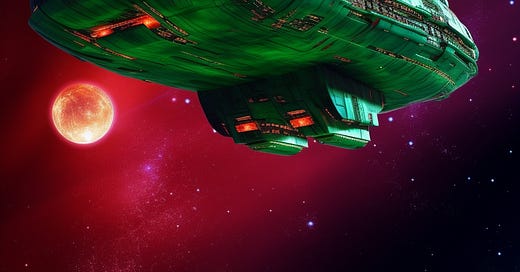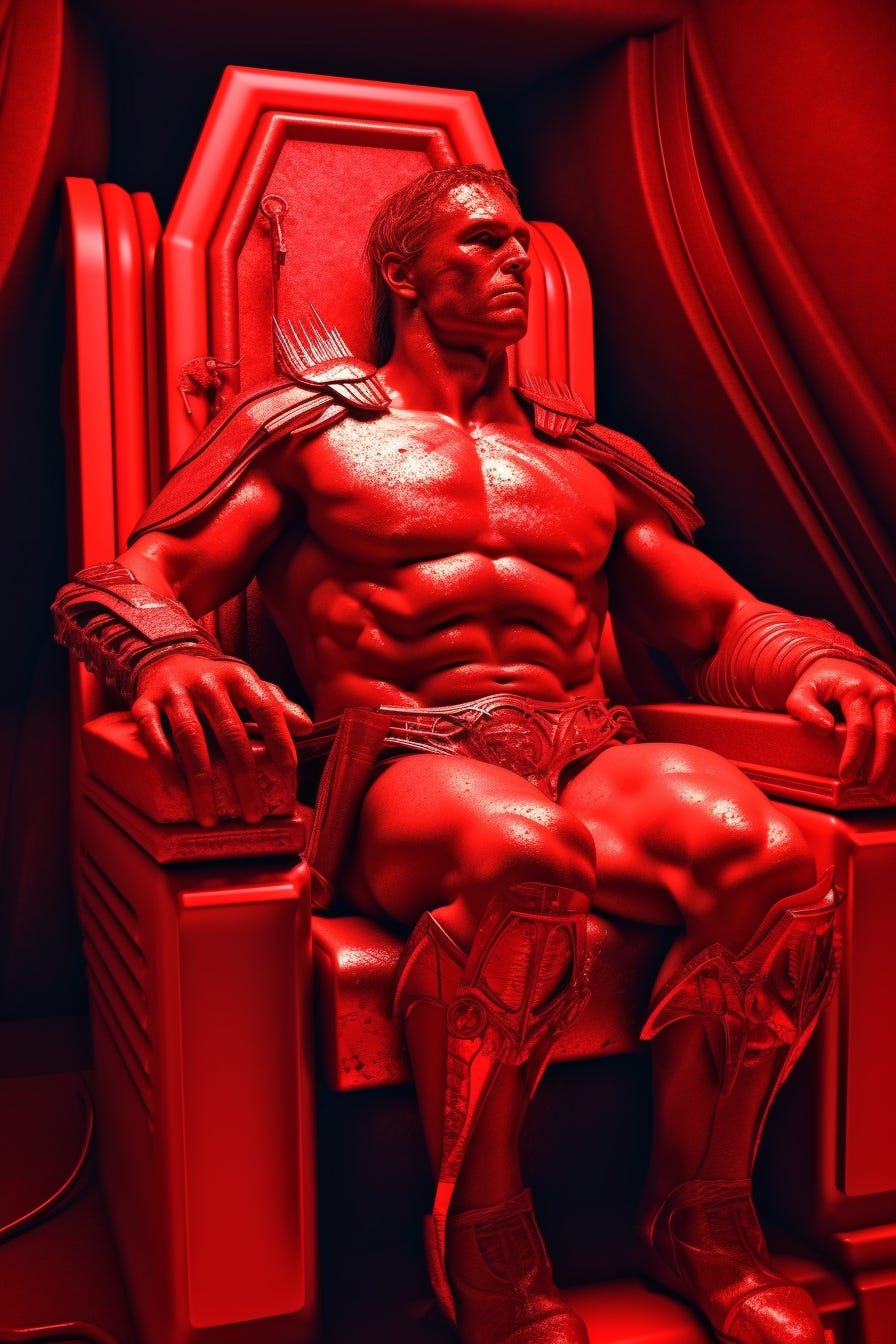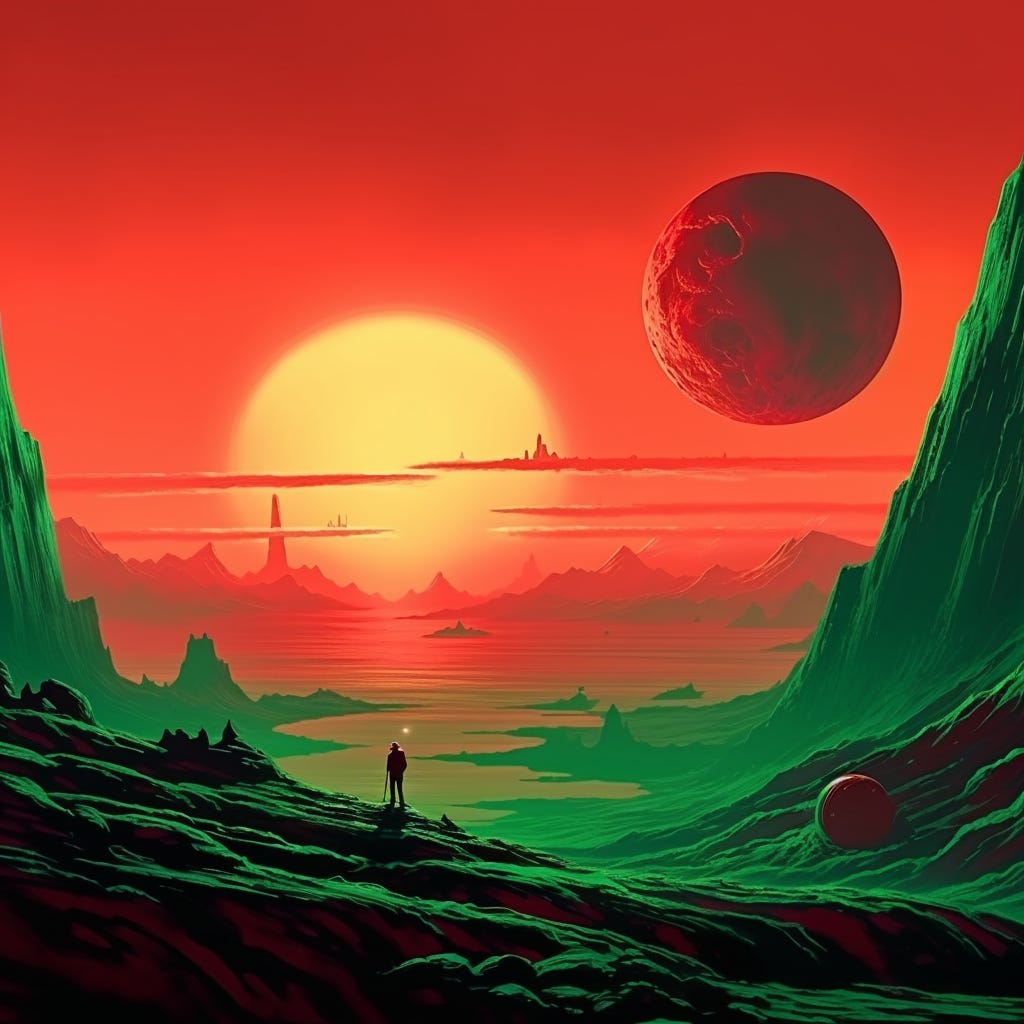Proxima B shimmered emerald green in the distance. Its magnetic field captured energy from the nearest sun and diffused it across the planet's atmosphere in an intense auroral display. The Hero of Alexandria limped towards it with one engine sputtering and the other dead. Weakened by a journey of four light years, the ship floated through infinite space. Her windows, artificially tinted, protected the crew inside from the glare of three suns. The closest, a red dwarf, tinged the ship in hues of red and left her titanium walls draped sanguine.
Flavius, sitting in the Captain's chair, basked in the red light, his blonde hair wavy, face cleanly shaven. Like the Empire, he was made up of right angles and carved from marble.
"Captain, if we land now, we likely won't be able to take off again," Cassia said. She was his first officer. Brown hair cropped at the shoulders framed blue eyes and a petite nose.
"And if we don't, then what of Rome?" Flavius asked.
"There will be other ships," Cassia said. "Where is the honor in dying?"
"There is honor in trying," Flavius replied coolly. "Our whole civilization is built on the premise."
"And when we get to the ground, and find it barren, what then?" she asked. "This ship isn't outfitted for settlement. Our supplies are low. At best suicide and worst... exile."
"If we turn back now, we'll be lucky if our names make a footnote in the histories."
"And if we land, and confirm the planets' conditions, then die?" Cassia said. "What is gained?"
"Forty years!" Flavius exclaimed. "Do you know what could fall apart in forty years? There are no second chances. Time is the tight rope we walk across. Failure the abyss we balance over. To stop is death, to falter is to fail."
She knew he was right, but her duty wasn't to agree. It was to disagree. Her arguments were the whetstone for his ideas. For legionnaires, thinking was war and Mars the god of Rome for a reason.
"Imagine if Nero had been allowed to live," Flavius continued. "If the Pisonian Conspiracy had failed. Would we be here? Or would humanity be emerging from a dark age?"
There was no need to imagine. Cassia had read the alternate histories. Quantum computing had filled complex models with alternate timelines. Modeled what could have been had a singular event changed. While valuable, the technology had unforeseen costs. It couldn't predict the future, only reinterpret the past. This led to an almost schizophrenic obsession with making the risky decisions, with forward advancement at all costs. With destiny no longer a thing to resign oneself to, it was a spear to be wielded, and that often meant thrashing wildly against the pitch black of possibility.
The Pisonian conspiracy had saved Rome from collapse. Had it failed, Nero would have committed suicide four years later. His death would have meant upheaval. But more importantly, the Aeolipile would have never been recognized as the revolutionary technology it was. It was Emperor Gaius Piso's reign that had refocused on engineering. His reign that created the steam engine some fifty years after the Hero of Alexandria's discovery.
In the year 903, trains connected Rome to China giving her access to newly invented gunpowder. And by the year 953, Rome had replaced slings and pilums with rifles. And three hundred years after that, there were no other countries, no tribes, no empires — only the Imperium, only Roman citizens and tributes. The trains transformed Rome into a global empire. They replaced slaves with steam. What Rome had done with the road, she exponentialized with rail.
Flavius walked to the glass windows of the bridge, his crimson cape purple beneath the red glare of Proxima Centauri.
"I know the histories, Flavius, and I find no error in your arguments," she relented.
He smiled back at her, his feathered hair and beaked nose giving the impression of an eagle, and said, "I know, Cassia. I know."
When the Hero smashed into Proxima B's desert, she broke in half, killing fifty of her passengers on impact. One hundred more were critically injured. Flavius and Cassius were fine, as were the other three hundred crew members located in the front of the ship.
Flavius tested the air and found the atmosphere breathable. A little light in the way of oxygen, but within parameters. He stripped off his helmet with a hiss.
They had landed in a desert, no more than ten miles away from the planet's largest body of water. The soil's black sand reminded him of crushed obsidian. The sky danced shades of green and red.
The next day they set up the Quant tower. The communications tower only worked from a set position in space. This made communication impossible at lightspeed. Granted, both Proxima B and Earth were moving, but their movements were accounted for by mathematical models pre-programmed into the towers.
Flavius typed his message.
< Landed on Proxima B. Ship destroyed. 300 survivors. Planet habitable. Send Colony ship. Glory to the Imperium. >
He smiled at Cassia. She looked worried. It had taken them four years to get here, while forty years had passed on Earth. The communication tower beeped and Flavius read the screen.
< The Imperium is no more. We are the Federation of Free citizens. There will be no colony ship. Space exploration banned. >
Flavius collapsed backwards onto his haunches, his face ghost white.
They were it. Just shy of repopulation numbers, unless... the embryonic chambers. His mind raced for ways forward. Raced towards the risky option, like the one that had brought them to the surface.
No, the Imperium would not die. It would continue. It's last act, impregnating a distant planet. And he was the Imperium's son — the First and Last, Son of Rome.
The essay above is my submission to the STSC Symposium, a monthly set-theme collaboration between STSC writers. The topic this month is Trains.








This is awesome. Nice use of the AI images and crisp writing. I'm excited to read more!
I really liked this. I just read all of your flash during breaks at work, and honestly it’s a breath of fresh air from all the creative nonfiction (mine included) and journalism here. Excited to check out your long-form work!